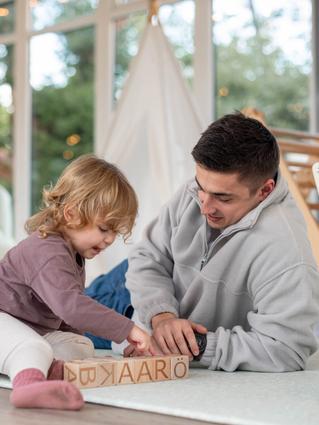
Toddlers of this age…
- Will have all their milk (primary) teeth by the time they’re about 2½:
- Will probably be sleeping 11-12 hours at night - sometimes with a nap during the day
- Between the ages of 2 and 3, will grow on average about 8cm (just over 3”) and gain about 2kg (just under 4½ lb) in weight
- 10 teeth on the top and 10 on the bottom
Can your toddler…
- Build a tower of blocks?
- Point to things in books, such as a cow, a dog, or a ball?
- Make animal noises?
- Turn the pages of a book?
When they’re good, they’re very, very good…
We’ve all heard about the ‘terrible twos,’ and this can, on occasion, be a very demanding time. Toddlers are testing boundaries, learning to assert themselves and experiencing big feelings they don’t always know how to express. But it’s also a magical age, full of discovery, imagination and connection.
One of the biggest changes you’ll notice is in their language development. Many little ones experience a burst in vocabulary between 2 and 3 years old – suddenly, they’re putting words together, asking “why?” on repeat and doing their best to copy everything they hear (and they hear everything!). You can help by chatting to your toddler throughout the day, describing what you’re doing, singing songs together and making time for reading books. Even short stories become firm favourites when read again (and again… and again!).
During this year, your toddler might start nursery, learn to play imaginatively and explore counting colours, among many other things - so much is happening! You can encourage imaginative play by happily ordering and accepting (again and again!) imaginary cups of tea or plates of food. Play shops with your little one or help to look after dollies, master puzzles or join in a session of 'vroom vroom'ing cars around the lounge. It’s an exciting phase, so even if it’s sometimes a challenge, take time to soak in just how much they’re learning and growing.
Time for a check-In
Around the age of 2-2½, your toddler will be offered a third health and development review, usually carried out by your health visitor or children’s nurse. This is a good chance for you to talk about how things are going – from sleep and eating habits to speech, social development and anything else on your mind. No question is too small, and it’s a helpful moment to raise any concerns you may have or simply get reassurance.
Thinking about toilet training
This stage is when many parents start thinking about toilet training. Some little ones show signs of readiness early on, while others may not be interested until they’re closer to 3 – and that’s completely normal. Signs that your toddler might be ready include staying dry for longer periods, being aware of wet or dirty nappies, showing interest in the toilet, or being able to follow simple instructions.
There’s no rush – it’s all about waiting until your toddler is ready and approaching in a relaxed, encouraging way. If you’re unsure about how or when to start, your health visitor can offer tips and advice to help you feel confident when the time is right.
